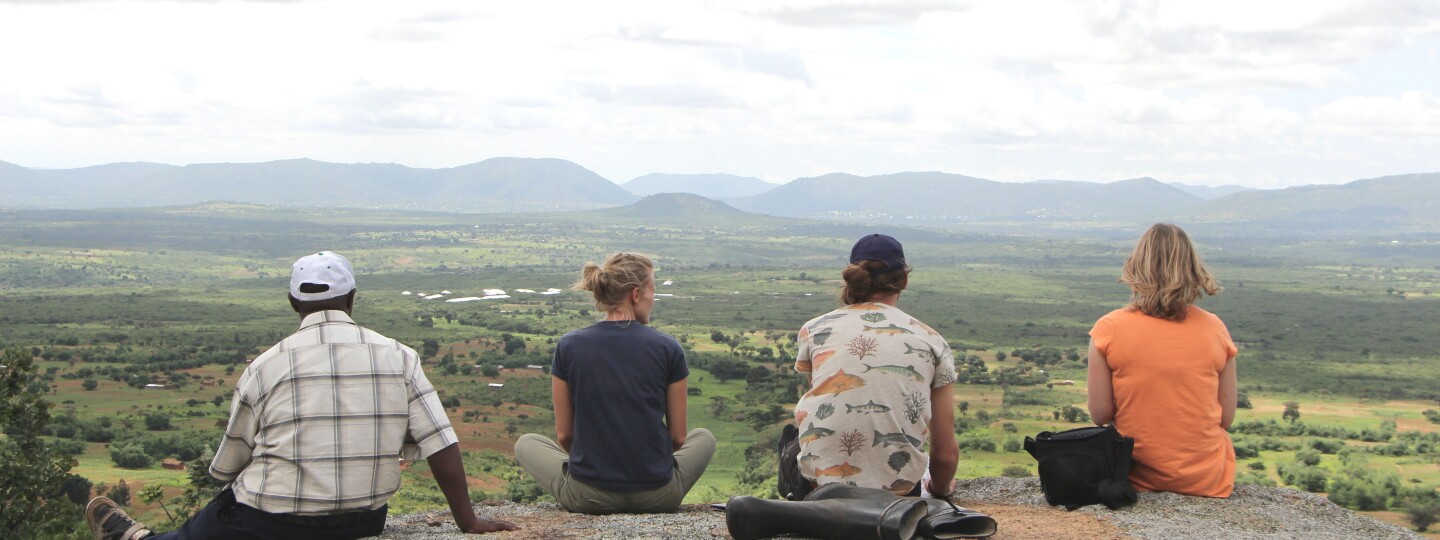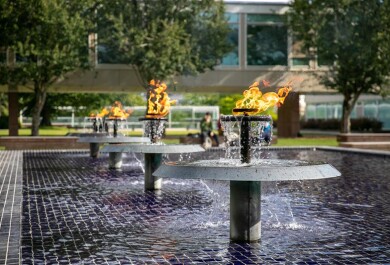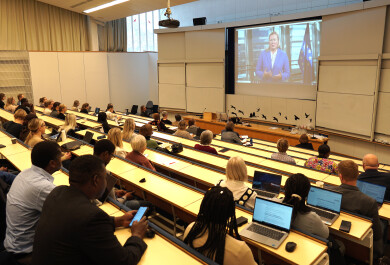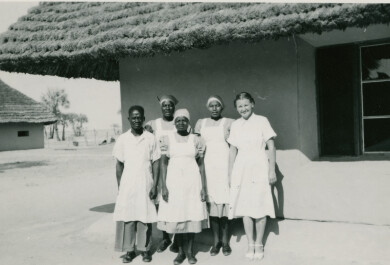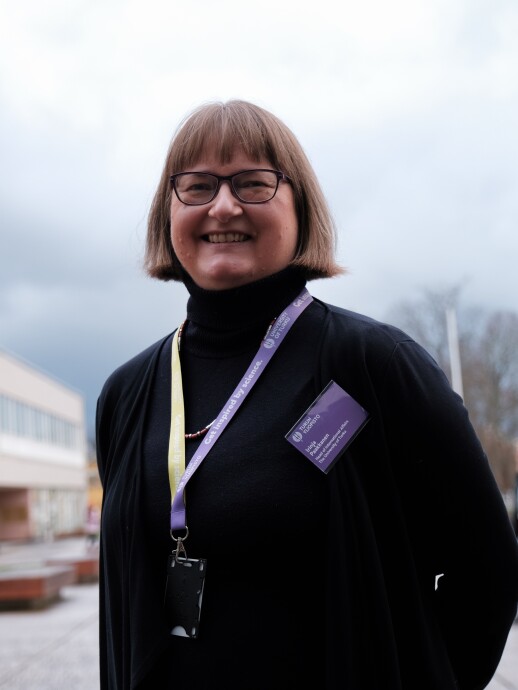The University of Turku aims to be at the forefront of academic collaborations and innovations with Africa. Through long-term strategic partnerships and mutual development of expertise, we strive to strengthen our scientific and societal interaction with the African academic community and other stakeholders of the continent.
The website is under construction.
Cooperation with Africa
Finland-Africa Platform for Innovation (SDG 9) is a network advancing multidisciplinary, innovative collaboration between higher education institutions and other actors in Finland and in Africa. FAPI supports UTU’s an active role in cooperation with different actors in the Global South and Africa. The aim of the network is to advance the United Nations Sustainable Development Goal 9 in Africa by promoting innovations together with African partners. University of Turku coordinates the network.
Examples of FAPI projects:
- Southern African Alliance (SAA)
- Sustainable Engineering thematic module
- UTU Geospatial Data and Digital Technology Hub for transformative innovations in the global South
- Online HealthEdu UTU-Africa (AFFEN project)
- Co-innovation of an Affordable and Effective Cardiopulmonary Resuscitation Training Solution for Africa (Maendeleo project)
- Community-driven tree planting for sustainable forestry in Namibia (starting 2024)
- Long-term sustainability of the international Mental Health Literacy network (starting 2024)
- Generative AI assisted digital educational platform (starting 2024)
- Africa Finland Education Network (AFFEN project)
For more information, visit the Finland-Africa Platform for Innovation website.
Networks
The African Forum for Research and Education in Health (AFREhealth)
The African Forum for Research and Education in Health (AFREhealth) is an interdisciplinary health professional grouping that seeks to work with Ministries of Health, training institutions and other stakeholders to improve the quality of health care in Africa through research, education and capacity building. It is a conglomerate of individuals, institutions, associations and networks from all the geographic and linguistic regions of Africa namely Anglophone, Francophone, Lusophone and Arabophone. Membership is open to African and external stakeholders committed to an Africa with strong, self-sustaining and robust health systems.
>>For more information, visit AFREhealth website
Coimbra Group
Coimbra Group of European Universities, founded in 1985 is committed to creating special academic and cultural ties in order to promote, for the benefit of its members, internationalisation, academic collaboration, excellence in learning and research, and service to society. It is also the purpose of the Group to influence European educational and research policy and to develop best practice through mutual exchange of experience. The University of Turku is actively involved also in its working groups eg. Latin America and Global Partnerships. The work is based eg. on the issues of capacity building and improvements of institutional capacities also with Sub-Saharan partners.
>>For more information, visit Coimbra Group's website
CONSAMS
CONSAMS - The “Consortium of New Sub-Sahara African Medical Schools” - was founded in 2011 under the original name of the “Consortium of New Southern African Medical Schools.” At an ensuing Annual General Meeting, it was decided to expand the organization to include members across the African continent and beyond southern Africa - hence the name change from “Southern African” to Sub-Sahara African. Today CONSAMS is rapidly expanding across Africa to include new medical schools that are within about 10-15 years of graduating their first class of medical students.
>>For more information, visit CONSAMS website
SANORD
Launched in 2006, Southern African – Nordic Centre (SANORD) is committed to advancing strategic, multilateral academic collaboration between institutions in the Southern African and Nordic regions in order to address new local and global challenges of innovation and development. The University of Turku is one of the founding members of SANORD.
>>For more information, visit SANORD website.
TFK funded projects
Interprofessional simulation education in Africa
The aim of this project is to innovate simulation pedagogy education applicable in Africa in collaboration with African higher education institutions. With the help of innovative simulation pedagogy education, medical and nursing trainers will be trained in such a way that they can teach more students independently in their own facilities. The University of Turku is taking the leading role in the funding application and will collaborate with Tampre University to coordinate the main activities. However, all partner institutions will participate in the designing and implementation of the course contents and simulation cases. The goal is to strengthen the existing educational cooperation among four African countries (South Africa, Namibia, Tanzania and Rwanda). This project will pool the expertise of each university to create an environment of high-quality training in simulation pedagogy through virtual collaborative teaching activities, staff mobility and hands-on simulation sessions of medical and nursing educators.
>>For more information, visit here
UniPID
Finnish University Partnerships for International Development (UniPID) is a network of Finnish universities where the University of Turku is actively involved. The network supports its members' global responsibility actions and strengthen their response to global challenges. UniPID offers a variety of support services for the interdisciplinary studies, research and societal impact of universities related to global development. The proposed Advisory Group contact from the University of Turku is currently serving in the UNIPID Board 2021–23 as a Vice-Chair (Prof. Niina Käyhkö UTU).
>> For more information, visit UniPID website
UTU Global South Network
The Global South Network brings together the various experts of the University of Turku who focus on issues concerning Global South. The purpose is to create opportunities to embark on joint, interdisciplinary research projects as well as to promote existing research.
>>For more information, visit the UTU Global South Network website
MoUs
UNECA
In spring 2019, the University of Turku and the United Nations Economic Commission for Africa (UNECA) signed a Memorandum of Understanding for advancing the UN’s Sustainable Development Goal 9 on creating a sustainable industry, innovations, and infrastructures. The collaboration aims to promote the development of research, science, teaching, innovations and decision-making in Africa. Special attention is paid to Africa's innovation systems, activities in higher education institutions, institutional and academic entrepreneurship, sustainable development and expertise in new technologies. The aim is also to enhance the mobility of experts between Finland and Africa.
>>For more information on the partnership can be found here.
Botswana
Pedagogies of Biodiversity and Environmental Sustainability (PEBES)
PEBES is a partnership among the University of Turku (FIN), Humak University of Applied Sciences (FIN) and Botswana University of Agriculture and Natural Resources. It offers students of these universities a dive into transdisciplinarity and additional courses under the theme of biodiversity, education and environmental sustainability.
>>For more information, visit PEBES website
Kenya
Lesotho
LETSEMA
LETSEMA is a collaborative effort implemented by a consortium between National University of Lesotho, Bethel Business and Community Development Centre, Finland Futures Research Centre and Linnaeus University. LETSEMA is a Erasmus+ Capacity Building in Higher Education project.
>>For more information, visit LETSEMA website
PROPEL
PROPEL is a collaboration project between the National University of Lesotho (NUL), University of Turku (UTU) and Aalto University (AU). The main objectives of PROPEL are to enhance internationalization activities between partner universities and to engage in capacity building at NUL to develop the quality of futures-resilient sustainable energy education through the training of trainers-approach. The project enhances the skills and competences of HEI staff in sustainable energy production and consumption by focusing on problem-based learning, online learning, and blended learning methodologies. The project supports the NUL’s MSc in Sustainable Energy programme and competences of NUL teaching staff to deliver high quality learning outcomes to students in both classroom and online environments.
>>For more information, visit Finland's Future Research Centre's website
Namibia
The European Research Council (ERC) Synergy Grant “BlackHolistic”
The researchers will build the first ever African millimetre-wave radio telescope in Namibia to achieve their goal. The telescope will take part in the global Event Horizon Telescope network that became famous for making the first image of a black hole. The new grant will help to transform this network from making still images towards making movies and to understand black holes across the entire Universe.
>>For more information, visit the website
Revisiting Finnish-Namibian Relations since the 1860s
The project Revisiting Finnish-Namibian Relations since the 1860s is part of a collaboration connected to the strategic partnership between the University of Turku and the University of Namibia. It brings together Finnish and Namibian historians and other scholars to analyse historical and modern connections between the two countries.
>>For more information, visit the project's website
UTU@Windhoek: Future Tech Lab in Namibia
The Namibia Campus hosts a wide range of research activities along with University of Turku's Future Tech Lab which provides the remote presence link back to Finland. Future Tech Lab is an international community of people in multiple roles, from diverse backgrounds with different expertise.The Lab is a home for study programs at different levels and it hosts a number of research, development and innovation projects with international partners.
>>For more information, visit Future Tech Lab in Namibia website
Nigeria
The Tertiary Education Trust Fund (TETFund)
The Tertiary Education Trust Fund (TETFund) was originally established as Education Trust Fund (ETF) by the Act No 7 of 1993 as amended by Act No 40 of 1998 (now repealed and replaced with Tertiary Education Trust Fund Act 2011). It is an intervention agency set up to provide supplementary support to all level of public tertiary institutions with the main objective of using funding alongside project management for the rehabilitation, restoration and consolidation of Tertiary Education in Nigeria.
>>For more information, visit TETFund website
South Africa
Tanzania
Global South, the Digital Data Innovation Hub (DIDAIHUB)
In the vision to scale-up research and education solutions in the Global South, the Digital Data Innovation Hub (DIDAIHUB) project builds on the work already done in two existing collaborations in Africa: GeoICT4e and The Resilience Academy. It aims to create a platform through which solutions can be disseminated and potentially implemented with new partners. The platform is not only for solutions from the GeoICT4e and Resilience Academy projects but serves projects and researchers related to the Global South, digital innovation, and data at the University of Turku.
>>For more information, visit the DIDAIHUB website
GeoICT4e, Tanzania
GeoICT4e is founded on the cooperation between University of Turku, Ardhi University, University of Dar es Salaam, Sokoine University of Agriculture, State University of Zanzibar, Moshi Co-operative University, Turku Unversity of Applied Sciences and Novia University of Applied Sciences. The project focuses on improving management and teaching capacities of Tanzanian higher education institutions in socially innovative geospatial and ICT education. The aim is to improve both staff competence and students' learning opportunities, as well as to create an open and wide access to e-learning assets for the students and beyond.
>>For more information, visit the GeoICT4e website
Tanzania Resilience Academy
Resilience Academy is a partnership between four academic institutions in Tanzania: Ardhi University, University of Dar es Salaam, Sokoine University of Agriculture and State University of Zanzibar with the University of Turku. It is an initiative of the Tanzania Urban Resilience Program , a partnership between the Government of Tanzania, the World Bank, and the Foreign, Commonwealth and Development Office. The objective of The Resilience Academy is to equip young people with the tools, knowledge, and skills to address the world’s most pressing urban challenges and ensure resilient urban development.
>>For more information, visit The Resilience Academy website
UTU Tanzania Team Research and Education Cooperation
The Unversity of Turku has been working in Tanzania since 2003 with both Tanzanian and international partners. Our research topics in Tanzania are broadly related to the analysis of human-nature dynamics with landscape and geospatial approaches and GIS/ICT technologies, education and business.
>>For more information, visit UTU Tanzania Team website
